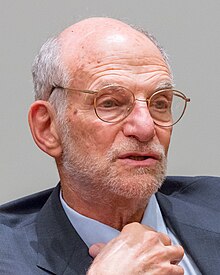Michael Rosbash
Michael Morris Rosbash (* 1944 in Kansas City , Missouri ) is an American molecular and chronobiologist and professor at Brandeis University in Waltham , Massachusetts . In 2017 he was awarded the Nobel Prize in Physiology or Medicine together with Jeffrey C. Hall and Michael W. Young .
Life
Michael Rosbash's parents were Jews and had to leave Germany in 1938. The family moved from Kansas City to Boston , Massachusetts when Michael was a toddler. Rosbash studied chemistry at the California Institute of Technology (Caltech) in Pasadena , California . After an internship with Norman Davidson , however, he began to be more interested in biology. Rosbash graduated with a bachelor's degree in 1965 . After a year as a Fulbright scholar at the Institut de biologie physico-chimique in Paris , he went to the Massachusetts Institute of Technology (MIT) in Cambridge , Massachusetts, where he received a Ph.D. in biophysics . Rosbash worked as a postdoctoral fellow at the University of Edinburgh in Scotland . Since 1973 he has been on the faculty at Brandeis University in Waltham . Currently (as of 2011), he has been professor of biology and director of the National Center for Behavioral Genomics (National Center for Behavioral Genetics ). Rosbash is still a professor of molecular biology at the Massachusetts General Hospital at Harvard University in Boston. Rosbash has also been doing research for the Howard Hughes Medical Institute (HHMI) since 1989 .
Act
Rosbash made outstanding contributions to the study of RNA processing and circadian rhythms . Together with Jeffrey Hall Rosbash was in 1984 the first time period , a " Verhaltensgen the" circadian rhythm clone . Her work subsequently led to the identification and functional analysis of the proteins that underlie the biological clock of the fruit fly ( Drosophila melanogaster ). Hall and Rosbash proposed a negative feedback of transcription before and mechanism of biological clock. The model is still valid and could be applied to all living beings, including humans. The Chronotherapy considered as potential application of research results in people with insomnia . More recent work by Rosbash deals with the relationship between the pacemaker of the biological clock in fruit flies and the alternation of light and darkness, as well as the neural circuits that underlie the alternation of activity and rest.
Awards (selection)
- 1988: Guggenheim grant
- 1997: Membership in the American Academy of Arts and Sciences
- 2003: Membership in the National Academy of Sciences
- 2007: Fellowship in the American Association for the Advancement of Science
- 2009: Gruber Prize for Neuroscience (with Jeffrey Hall and Michael W. Young )
- 2011: Louisa Gross Horwitz Prize (with Jeffrey Hall and Michael W. Young)
- 2012: Canada Gairdner International Award (with Jeffrey Hall and Michael W. Young)
- 2012: Massry Prize (with Jeffrey Hall and Michael W. Young)
- 2013: Wiley Prize in Biomedical Sciences (with Jeffrey Hall and Michael W. Young)
- 2013: Shaw Prize in Medicine (with Jeffrey Hall and Michael W. Young)
- 2017: Nobel Prize in Physiology or Medicine (with Jeffrey Hall and Michael W. Young)
Web links
- Michael Rosbash, Ph.D. , Rosbash Lab and Faculty Guide at Brandeis University (brandeis.edu)
- Bio and Research Abstract at the Howard Hughes Medical Institute (hhmi.org)
Individual evidence
- ↑ Livestream via nobelprize.org (accessed on October 2, 2017).
- ↑ Americans win Nobel medicine prize for circadian rhythm work . ( timesofisrael.com [accessed October 2, 2017]).
- ^ John Simon Guggenheim Foundation - Michael Rosbash. In: gf.org. Retrieved February 11, 2016 .
- ↑ Book of Members 1780 – present (PDF, 478 kB) of the American Academy of Arts and Sciences (amacad.org); Retrieved October 1, 2011
- ↑ 2009 Gruber Neuroscience Prize at gruberprizes.org; Retrieved October 1, 2011
- ^ Louisa Gross Horwitz Prize - 2011 at Columbia University (columbia.edu); Retrieved October 1, 2011
- ↑ Michael Rosbash PhD at the Gairdner Foundation (gairdner.org); Retrieved August 7, 2012
| personal data | |
|---|---|
| SURNAME | Rosbash, Michael |
| ALTERNATIVE NAMES | Rosbash, Michael Morris |
| BRIEF DESCRIPTION | American molecular and chronobiologist |
| DATE OF BIRTH | 1944 |
| PLACE OF BIRTH | Kansas City , Missouri |
